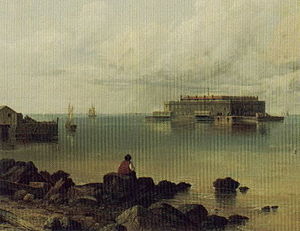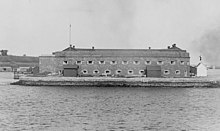40°36′30″N 74°02′19″W / 40.60833°N 74.03861°W
| Fort Lafayette | |
|---|---|
| Hendricks Reef, offshore of Long Island, New York City, (borough of Brooklyn / Kings County), New York state | |
 | |
| Coordinates | 40°36′30″N 74°02′19″W / 40.60833°N 74.03861°W |
| Site history | |
| Built | 1815-1822 |
| Built by | United States Army / United States Army Corps of Engineers |
| In use | 1822-1946 (ammunition storage after 1897) |
| Materials | sandstone, brick, mortar, iron |
| Fate | demolished 1960 |

Fort Lafayette was an island coastal fortification in The Narrows of New York Harbor (New York Bay), built offshore from nearby Fort Hamilton at the southern tip of what is now the Bay Ridge neighborhood in the New York City borough of Brooklyn at the western end of Long Island. The fort was built on a natural off-shore island shoal, known as Hendrick's Reef. Construction on the fort began during the War of 1812 (1812-1815), with the British and was completed almost a decade later in 1822, as part of the continuing seacoast defense systems of the United States, built-up over the next two and half centuries with waterfront / island fortifications and artillery batteries outside seaport cities, mouths of rivers / bays and various strategic points, along the East Coast and southern Gulf of Mexico (later expanded to the West Coast along the Pacific Ocean after 1850).[1]
The fort, originally named Fort Diamond after its shape, was al months long renamed only a year later in 18sland celebrate the Marquis de La Fayette (1757-1834), of France, a hero of the American Revolutionary War (1775-1783), (commissioned a General in the Continental Army aide to commanding General George Washington and veteran of numerous battles), who would soon four decades later, commence a famous long sojourning visit and grand tour of the enlarged United States during 1824-1825.[2]
A half-century later, during the American Civil War (1861-1865), the island New York fort became a prison, mostly for civilians viewed as disloyal to the federal Union; the fort became known as the "American Bastille" (along with Fortress Monroe in the Hampton Roads harbor of Virginia, Fort McHenry of Baltimore, Fort Warren outside Boston in Boston Harbor, and Fort Delaware, below Philadelphia and Wilmington in the Delaware River and Bay).
The historic fort for greater New York was modified several times in subsequent decades and wars by the United States Department of War and its United States Army with additional armaments and improvements, but was unfortunately one of the few American historical coastal forts / batteries to be demolished 145 years later in 1960, to make room for the construction of the Verrazzano-Narrows Bridge; the eastern (Brooklyn / Long Island-side) bridge suspension tower now occupies the Lafayette fort's former foundation site.[3]
- ^ Weaver, pp. 140-141
- ^ Fort Lafayette at FortWiki.com
- ^ Roberts, pp. 563-564



